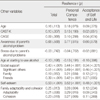Abstract
Purpose
The purpose of this study was to explore the resilience of adult children of alcoholics (ACOA) who are college students, and examine factors contributing to their resilience.
Methods
A total of 459 college students from a university in Incheon, participated in this study. Data were collected between April 6 to 30, 2010 using the Korean version of the Children of Alcoholics Screening Test (CAST-K), CAGE, Social Support, Self-Esteem, Family Adaptability and Cohesion, and Resilience measurements. Data were analyzed using the SPSS/WIN 18.0 program.
Results
Overall, ACOA group showed lower scores of resilience, social support, self-esteem and family adaptability and cohesion compared to non-ACOA group. Resilience among the ACOA group showed significant relationships with self-esteem (r=.53, p<.001), social support (r=.43, p<.001), and family adaptability and cohesion (r=.25, p<.013). Multiple regression analysis showed that 45% of the variance for resilience in the ACOA group was accounted for by age, gender, social support, self-esteem, and religion.
Conclusion
The results of the study show that self-esteem and social support are important determinants of resilience in ACOA, thus it is recommend that further resilience training programs for ACOA be developed to enhance their social support and self-esteem, and ultimately to increase their resilience.
Figures and Tables
Table 3
Comparison of Resilience, Social Support, Self-esteem and Family Adaptability and Cohesion between ACOA and non-ACOA

References
1. Dumont M, Provost MA. Resilience in adolescents: Protective role of social support, coping strategies, self-esteem, and social activities on experience of stress and depression. Journal of Youth and Adolescence. 1999. 28:343–363. doi: 10.1023/A:1021637011732.
2. Fischer KE, Kittleson M, Ogletree R, Welshimer K, Woehlke P, Benshoff J. The relationship of parental alcoholism and family dysfunction to stress among college students. Journal of American College Health. 2000. 48:151–156. doi: 10.1080/07448480009595690.
3. Han MR. Resilience, social support, spirituality in wives of alcoholics. 2003. Seoul: Yonsei University;Unpublished master's thesis.
4. Harter SL. Psychosocial adjustment of adult children of alcoholics: A review of the recent empirical literature. Clinical Psychology Review. 2000. 20:311–337. doi: 10.1016/S0272-7358(98)00084-1.
5. Hoffman JP. Investigating the age effects of family structure on adolescent marijuana use. Journal of Youth and Adolescence. 1994. 23:215–235. doi: 10.1007/BF01537446.
6. Im SB, Oh HY, Park YI, Lee EH, Lee S. Analytical review of resilience for preventive mental health nursing. Journal of Korean Academy of Psychiatric and Mental Health Nursing. 2002. 11:304–315.
7. Jones JW. The children of alcoholics screening test. 1981. Chicago: Family Recovery Press.
8. Kim HR, Jeon SY, Kim JH. The relationship of father's alcoholism, family functioning and parental attachment to the psychosocial adjustment among the adult daughters of alcoholic fathers. Korean Journal of Social Welfare. 2004. 56(4):317–343.
9. Kim JH. The college adjustment of adult children of alcoholics: Focused on moderating effect of protective factors. Journal of Social Work Practice. 2008. 7:131–157.
10. Kim MR, Chang HI, Kim KB. Development of the Korean Version of the Children of Alcoholics Screening Test (CAST-K): A reliability and validity study. Journal of Korean Neuropsychiatric Association. 1995. 34:1182–1193.
11. Kim YJ. Effect of healing program for children of alcoholics. Mental Health & Social Work. 2009. 31:30–62.
12. Kwon JS. The effect of parents' problem-drinking on children's resilience. 2003. Seoul: Yonsei University;Unpublished master's thesis.
13. Lee HW. Resilience of adolescents according to the problem-drinking in parents. 2003. Seoul: Yonsei University;Unpublished master's thesis.
14. Lee MH. Effects of group therapy on the mental health for alcoholic families. Journal of Korean Academy of Psychiatric and Mental Health Nursing. 2000. 9:315–321.
15. Mayfield D, McLedd G, Hall P. The CAGE questionnaire-validation of a new alcoholism screening instrument. American Journal of Psychiatry. 1974. 131:1121–1123. doi: 10.1176/appi.ajp.131.10.1121.
16. Ministry of Health & Welfare. The epidemiological survey of psychiatric illness in Korea 2006 (Issue Brief No. 11-1460000-003105-13). 2007. 08. Seoul: Author.
17. Ministry for Health, Welfare and Family Affairs & Korea Center for Disease Control and Prevention. 4th Korean National Health and Nutrition Examination Survey (2007). 2008. 12. Seoul: Author.
18. Ok KH. Social support and college adjustment in college student. Student Life Research. 2001. 8:21–39.
19. Olson DH, Portner J, Lavee Y. FACES III: Family adaptability and cohesion evaluations scales III. 1985. St. Paul, MN: University of Minnesota.
20. Palmer N. Resilience in adult children of alcoholics: A nonpathological approach to social work practice. Health and Social Work. 1997. 22:201–209.
21. Park BK, Lee DB, Lee TY, Cho YC, Kwon YH. Comparison of screening tests for alcoholism in terms of reliability, sensitivity and specificity. Chungnam Medical Journal. 2000. 27(1):37–47.
22. Park HS, Lee SG. Association between psychological characteristics of adult-child of alcoholics and psychosocial problems. Korean Journal of Social Welfare. 2001. 46:118–144.
23. Rosenberg M. Society and the adolescent self-image. 1965. Princeton, NJ: Princeton University Press.
24. Seo HS. SPSS (PASW) Regression analysis. 2009. Seoul: Hannarae Publishing Co.
25. Tiet QQ, Bird HR, Davies M, Hoven C, Cohen P, Jensen PS, et al. Adverse life events and resilience. Journal of the American Academy of Child and Adolescent Psychiatry. 1998. 37:1191–1200. doi: 10.1097/00004583-199811000-00020.
26. Wagnild GM, Young HM. Development and psychometric evaluation of the resilience scale. Journal of Nursing Measurement. 1993. 1:165–178.
27. Walsh F. Strengthening family resilience. 2006. 2nd ed. New York: The Guilford Press.
28. Werner E. Resilient offspring of alcoholics: A longitudinal study from birth to age 18. Journal of Studies on Alcohol. 1986. 47:34–40.
29. Yang HJ. Children's COA & psychological-social character by parent's problem drinking. Journal of Korean Home Management Association. 2007. 25(2):1–12.
30. Zimet GD, Dahlem NW, Zimet SG, Farley GK. The multidimensional scale of perceived social support. Journal of Personality Assessment. 1988. 52:30–41. doi: 10.1207/s15327752jpa5201_2.




 PDF
PDF ePub
ePub Citation
Citation Print
Print






 XML Download
XML Download